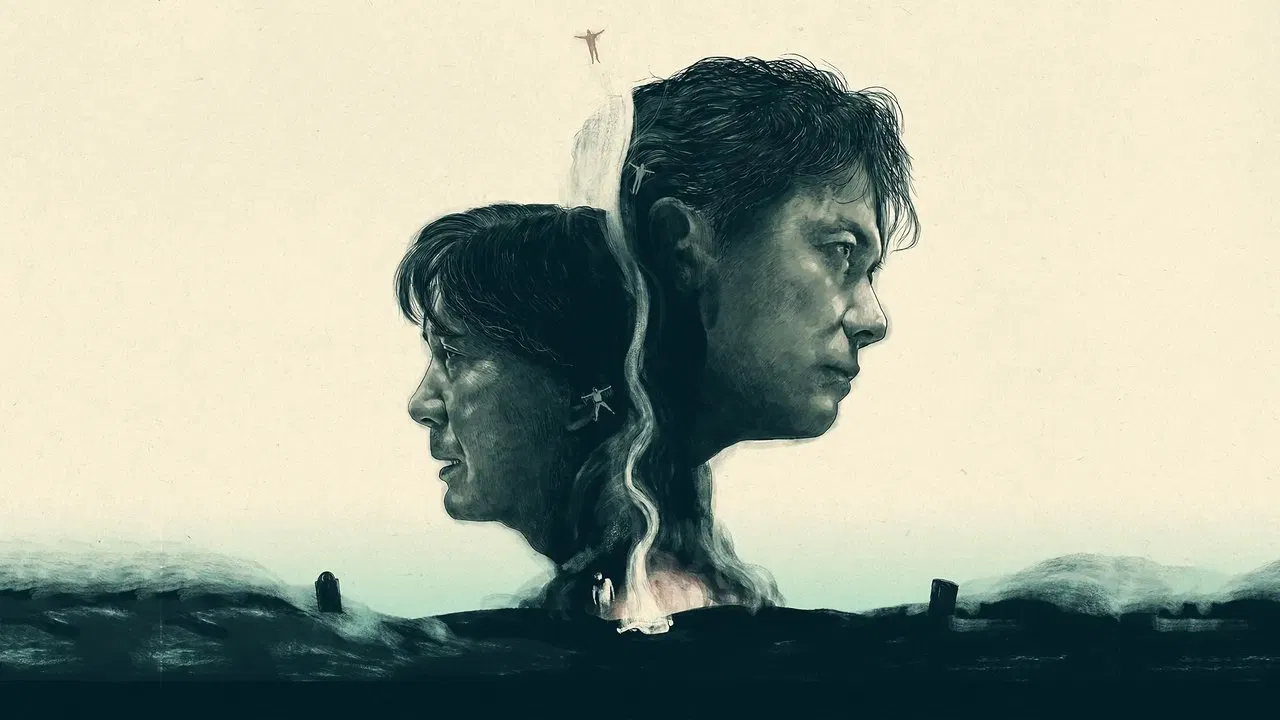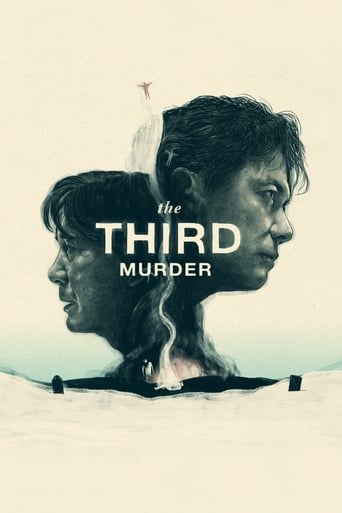asako
I'm sure there is some truth in it, but the film chose a quite cynical view on the judiciary system: no one tells or cares about the truth in the courtroom. So what is the 3rd murder? To me, it is the death sentence given to Misumi by such a system, but Koreeda leaves it to each of us to decide who Misumi is, what is the motivation of his puzzling actions, and who actually murdered the factory owner. This film reminded me of Kurosawa's "Rashomon" in the sense that both directors tried too hard, and the delivery is a bit too heavy handed.Koreeda tackled a new genre in this film, but still weaved in the struggle to be a father, or rather his guilt of being an absent father: the theme most notably expressed in "Like father like son" and in some way in "After the Storm".I miss the poignant ambiguity of "Maborosi" and gentleness of "After Life" but I'm happy to see him explore something new. Not a bad film, and it certainly deserves a little better rating than current 6.7 out of 10.
BiiivAL
An experienced lawyer undertakes to defend a man accused of brutal murder. Everything is clear, like a day. The accused confessed and in the distant past had already passed through a similar case. However, intuition tells the lawyer that in this case everything is too smooth ...The new work of Hirokazu Koreda (After the Storm, Son in the Father, Miracle, After Life) is fascinating at first sight and does not let go. The producer, a dog who has eaten on meditative festival pictures, delays into the "mainstream" narrative easily and unobtrusively. The tape, although it has a number of contingent plot surprises, uses the standard detective canvas only as a background for deeper reflections. Each dialogue or phrase dropped carries a semantic question, the answer to which the viewer is trying to find together with the director.Despite the seemingly outward asceticism of the production, the tape does not look simple at all. Excellent camera work Mikiya Takimoto, with whom the director worked on the paintings "Son in the Father" and "Diary of Umimati, literally erases the boundaries of reality. And the music of Ludovico Einaudi ("1 + 1", "Strange crime") harmoniously complements the magic cinema.The lead actor's duet is incomparable. Conversations and transformations of the "lawyer" Masaharu Fukuyama (John Woo's "Hunting for the person", "Suspect X", "Son in the father", "Summer formula", "Sensation!") And the suspect Koji Yakusho ("The Emperor in August", " Tree of the Cicadas "," Thirst "," Harakiri "and" 13 murderers "Takashi Miike) are built and lived filigree. In the background, the charming Kotaro Yoshida (The Clinic of Love, The Woman Who Loves Lies, the Doric of Sentimental Tokyo) looked good as a colleague in a law firm.Summarizing: definitely, a heap of awards of "the Japanese Film Academy" the tape has deserved quite deservedly. Excellent directing, an indescribable mood and parable motives in a deceptively detective shell. Movies of great style.
politic1983
"I've only made two so far and I want to try making a wide variety of films. I want to make action films, period films."
(Kore-eda Hirokazu, 1999)Speaking with Mark Schilling for Premier back in 1999 with only "Maboroshi no Hikari", "After Life" and his documentaries under his belt, it was clear Kore-eda was going down the route of the auteur, though his penchant for the unconventional family drama was still some years to come. Since 2008's seminal "Still Walking", "Air Doll" aside (which is probably where it can stay), his work has seen weak father figures, bickering couples, children fending for themselves and grandparents that know best. But with 2006's "Hana" Kore-eda's biggest step into new territory so far with a period piece, his latest film "The Third Murder" sees him take on the courtroom drama: a genre typically building suspense to the inevitable plot twist reveal. Misumi (played by hair connoisseur Koji Yakusho) confesses to the murder of a local factory owner: his former boss. A convicted murderer on two counts in his native Hokkaido, it comes soon after his release form his thirty year sentence, and as such, he is likely to face the death penalty. Up steps Shigemori (taller-than-average Masaharu Fukuyama) and his legal firm to defend Misumi: their sole purpose to reduce his charge from murder and burglary to murder and theft, thus potentially seeing Misumi cheat death. Misumi, playing the sap, goes along with Shigemori's idea, but the more Shigemori delves, the less it seems a clear, open-and-shut case. "Links" are uncovered between Misumi and his former boss' widow and their daughter, Sakie (our little sister Suzu Hirose) - seemingly the victim of her father's abuse. As such, Shigemori starts to question the true motives of Misumi, not just as a legal case, but as to the true nature of justice. With so many lives affected, a selection of narrative options are offered, without giving a firm conclusion as to which was the true course of events, leaving Shigemori questioning his role, as Misumi realises his end goal. Plot twists in suspense dramas compare to trying to make people jump in horror films: they're a cover for lacking anything truly captivating to say or show. As such, the nature of offering many potential stories could lead to a confused mess of a film, but Kore-eda, while working in a different area, is becoming something of a master at evaluating the human condition, using the contradictory narratives to leave you questioning truth and motive, rather than a simple twist at the end to try and keep you interested.Social comment as to the justice system is offered throughout, perhaps sometimes a little too plainly, though always aimed at the morality and ethics of an organised justice system. Misumi may have admitted to the murder, but the more he reveals, the less straightforward his guilt becomes. Shigemori - oft referred to as a lawyer who keeps criminals from facing their guilt by family and foe alike - simply deconstructs narrative to fit his case for the defence. As with "Like Father, Like Son", the lead characters' differences create archetypes to help Kore-eda in making his point. Shigemori, as with Nonomiya, starts from the moral high ground, but soon realises he is the one who needs to ask himself some searching questions. Shigemori and Misumi hold an obvious - and sometimes literal - mirror to each other, with Fukuyama's character again having to be the one to concede, much as Hiroshi Abe finds himself in "Still Walking" and "After the Storm". Stylistically, there are perhaps some more mainstream cinema staples put to use, Kore-eda perhaps trying to take himself out of the comfort zone he may have slipped into. Shigemori's dream sequence is somewhat out-of-the-norm, as well as attempts at more poignant visuals to music, in an attempt to create iconic shots. For some this may be seen as a further decline into mainstream cinema, away from the more masterfully understated work of his first two films. However, it could also be perceived as a bridging of a gap, with the film taking the top awards at the Japan Academy Prizes a step in the right direction for Japanese cinema: one of the nation's best working directors getting his just rewards. A legal drama, "The Third Murder" doesn't necessarily rely on the suspense of a thriller, but still keeps you watching as to what transpires before you. Despite some differences, this is very much a Kore-eda film: Shigemori, Misumi and Misumi's victim all play the role of weak father figures, with Shigemori's father the grandfather with greater knowledge. No easy solutions are offered, with greater happiness found away from one's initial objectives. The "face-to-face" scene between Shigemori and Misumi towards the film's end offers some of the iconic shots perhaps aimed for, with Yakusho cementing himself as one of Japan's all-time great actors, deserving of his Best Supporting Actor gong at the Japan Academy Prizes. What starts off as a seemingly bumbling, forgetful and absent-minded fool, develops into a character of many layers. The truth is that Misumi wants to control people. By changing his story, resulting in the outcome Shigemori fought against, Misumi, the murderer, certainly held power over the lives of others

